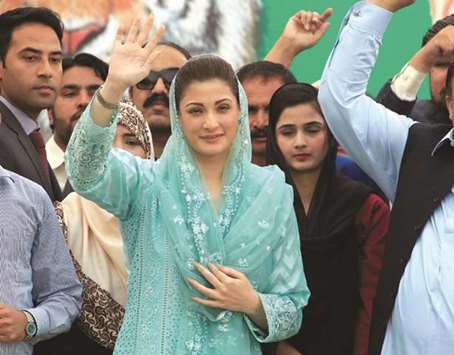
Imran Khan: assesses the PTI’s social media team every six months.
The Federal Investigation Agency (FIA)’s cyber-crime wing arrested two men in Rawalpindi in October last year, who were suspected of posting on social media material and content deemed to be contemptuous of major state organs.
The duo were said to be spreading propaganda through various fake social media accounts using proxy servers.
In the light of growing crackdown against social media activists in the country, Interior Minister Ahsan Iqbal had announced plans to formulate a framework to monitor social media in order to prevent it from being used as a tool to malign national institutions and spread anarchy or extremism.
However, given the country’s burgeoning digital landscape and volatile political climate in the run-up to general elections, efforts to combat spam and propaganda online are becoming increasingly difficult to manage.
With over 44mn social media accounts in the country and more than 3mn Twitter users, mainstream parties and pressure groups are investing more than ever in social media campaigns.
“In Pakistan, 75% of trending topics [hashtags] on Twitter are about politics. It does not matter what is correct or true, [political] parties now see impact in numbers,” a member of a political party’s social media team said. “The aim is to reach a maximum number of people and get them to use the same hashtag. It is ideal to at least forward two agendas through bulk tweeting daily.”
In the race to inflate the importance of Twitter trends, the digital sphere has witnessed the birth and growth of automated bots and fake accounts.
“Punjab is the hub of bot vendors as it hosts two most active political parties on social media. People who started small in the bot business in 2013 have now been recruited into political media cells,” said Qazi Ahmad of Pakistan Computer Emergency Response Team (PakCert) said.
According to PakCert estimates, one out of five users is a fake account in Pakistan.
“For every 100 tweets/followers, the market rate is around Rs1,000,” he revealed, adding that because new restrictions from Twitter did not allow a single IP (Internet Protocol) address to run more than three to five accounts, the use of proxy servers to bypass the restriction had gained popularity.
However, said Ahmad, the use of automated scripts was becoming difficult as Twitter was taking more stringent measures.
Often termed a “social media party”, the Pakistan Tehreek-e-Insaf (PTI) has launched its election strategy with a social media “summit”.
“With a member base aged 20-35, the aim of the summit is to first honour our digital activists and then to train them against abuse,” PTI social media secretary Dr Arslan Khalid said.
Comprising 1,000 official and 300 overseas members, he said, the team is assessed by PTI chief Imran Khan every six months on their performance online.
“Unlike our opponents, our social media summit is not about numbers but the quality of training. The participants attending the summits must have an active social media account,” he said.
When asked if there is a real presence of bots in Pakistan’s political battlefield, Dr Khalid confirmed that automated cyber-armies play a role in sowing political divisions online.
“Whenever a political development takes place, a wave of bot accounts spews hatred towards the party. The team has started to counter bot attacks by blocking their IP (addresses),” he said.
Having expanded her political presence through social media, Maryam Nawaz of the ruling Pakistan Muslim League – Nawaz (PML-N) has caught up fast on digital campaigning.
According to the head of the party’s social media wing, Atif Rauf, there are at present 1,000 active members devoted to political activism online.
The latest product in the PML-N’s pre-election strategy is its social media conventions.
“We have had six conventions so far and at least 10,000 youths from all walks of life came to attend,” he said, adding that the team is not restricted to online activism but was also responsible for work on the ground – creating “tanzeems” and organising events as well as ensuring voter participation.

